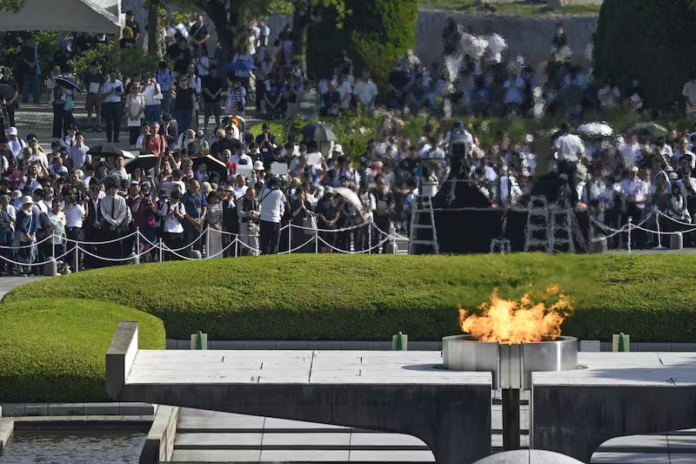Global Attendance Reflects Rising Concern
At the Hiroshima Peace Memorial Park, around 55 000 people stood in silence at 8:15 a.m., the exact moment the first atomic bomb struck the city in 1945 and changed the world forever.
This year’s gathering included survivors of the blast, their families, and envoys from a record 120 countries and regions, showing how fear of nuclear arms has spread across borders. The scene underscored a simple truth voiced by many: the threat once thought banished remains present and urgent.
Leaders Issue Strong Warnings on Nuclear Arms

UN Secretary-General António Guterres spoke through his high representative and stressed that the tools that brought such grief to Hiroshima and Nagasaki now serve as threats to whole populations.
He said that nations risk treating these weapons as bargaining chips, a shift that could edge the world closer to ruin. And Pope Leo XIV joined the appeal by urging nations to choose justice and talk instead of relying on fear and force. German and other European officials echoed this warning, pointing to Russia’s tense nuclear stance and saying a nuclear conflict offers no winners.
Japan’s Defense Budget Sees Major Growth
In a move that shows Okinawa is not the only part of Japan changing its stance, Tokyo decided to raise defense spending to 2 percent of its GDP by 2027. That adds up to roughly fifty-five billion dollars next year, a jump of nine point four percent in one year. New funds will buy missiles that can strike far-off targets and boost cyber and space operations.
The country plans to build two new ships with more missile cells and to expand its cyber force more than twenty times its current size. This plan marks Japan’s shift from guarding its own land to holding tools that can hold other nations at risk.
Survivors’ Voices Remain a Moral Force
As the years pass, the number of hibakusha—those who lived through the bombing—grows smaller, yet each testimony carries weight. Last year, the group Nihon Hidankyo won the Nobel Prize for their work urging peace and urging the end of nuclear arms.
The UN planted saplings from trees that withstood the blast outside its New York headquarters as living symbols of survival and resolve. Each story reminds the world that these weapons leave more than ruin; they scar generations.
Personal Analysis on Lasting Impact
I believe that the record attendance at this year’s ceremony shows a deep unease about how easily the same horrors could return. Many of us thought nuclear threats ended with the Cold War, but the growing budgets and new missiles prove otherwise. We heard calls for dialogue and justice. Yet actions speak louder than words, and Japan’s own shift in defense policy may unsettle its neighbors as much as reassure its citizens. The survivors’ accounts remain powerful, but real change needs more than speeches. It needs clear steps toward shrinking those arsenals rather than growing them.
Sources: abcnews.go.com

